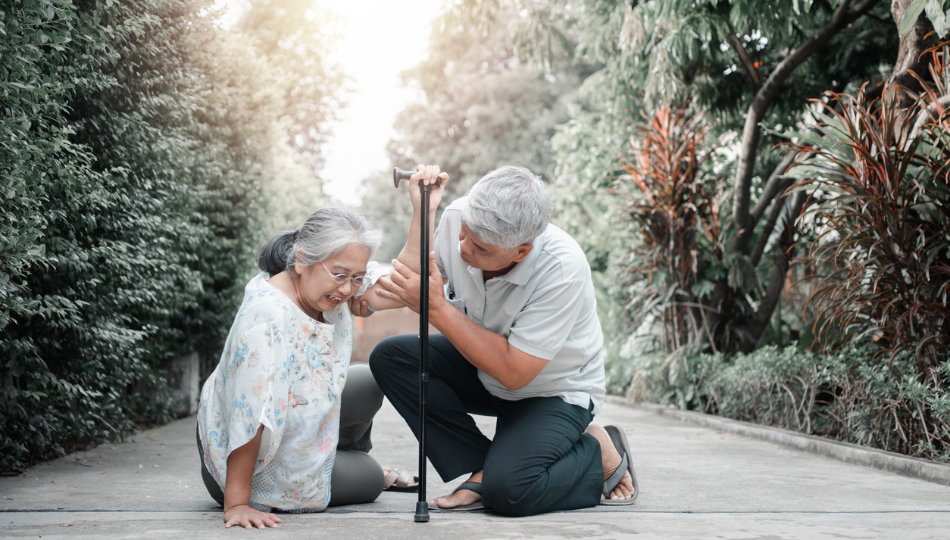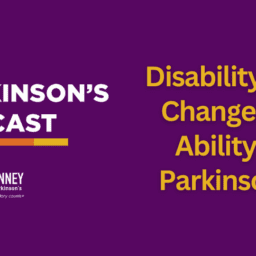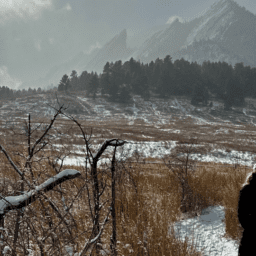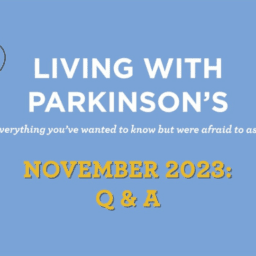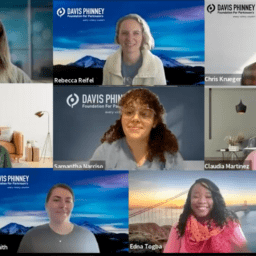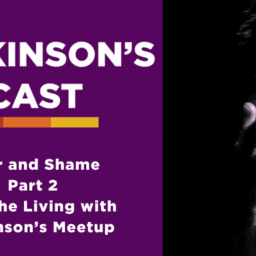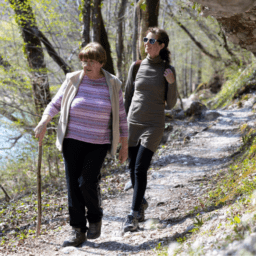Welcome to this month’s Living with Parkinson’s Meetup. We were thrilled to have Dr. Maria Allen, physical therapist, join our webinar this month and help us discuss falling. We had our typical lively discussion, received some great advice from our panelists and our viewers, and learned how to face the fears that falling causes. Unfortunately, this is our last meetup of the year, but we look forward to seeing you in January of 2023!
You can read the transcript below or you can download it here.
Note: This is not a flawless, word-for-word transcript, but it’s close.
Melani Dizon (Director of Education and Content, Davis Phinney Foundation):
Welcome, everybody. This is Melani Dizon. I’m the Director of Education and Content at the Davis Phinney Foundation, and you are here today for our Living with Parkinson’s Meetup it’s really great to see you. All right. So today, like I said, we’re going to talk about falls and we have a very special guest and expert on the topic. She has been working in this field for about 25, or 30 years. Maria Allen, calling all the way in from Germany today. Hello, Maria.
Maria Allen (Physical Therapist):
Great. Normally in California. Normally in California,
Melani Dizon:
Normally in Right by Germany.
Kat Hill, RN, NP (Ambassador, Davis Phinney Foundation):
Right by Germany.
Melani Dizon:
He’s right by Germany in California. It’s right there. It’s right there.so, thank you so much for being here. Maria, can you tell us, just a real quick intro about your work in this field, and then I’m going to have everybody else go around and just say who they are and do the normal introduction for the new people on, in the audience.
Maria Allen:
Sure. I’ve actually been a physical therapist for 39 years. Long time. Oh, sorry. Really long time. And I have been working with the Parkinson’s community for the last 10 years, pretty exclusively. I’m working in the San Francisco area, Santa Barbara, San Francisco, a beautiful part of California. And I work with people who need home health. So usually, a little bit later stage Parkinson’s and all kinds of other things. And I teach therapists, physical therapists, occupational therapists, how to work with people with Parkinson’s through Parkinson’s, wellness, recovery, or power. I work with Dr. Becky Farley. I’m faculty for them. So, I teach or 10, 11 courses a year for them. And I love to do education, so I give talks and I work with my community. And so, I’m happy to be here. I have this great panel of people to work with and see what kind of questions we can answer and things we can talk about.
Melani Dizon:
Excellent. Well, thank you, Maria. let’s go around. I’m going to just call who’s on my screen and the order they’re on my screen and just, say hello, who you are, how long you’ve been living with Parkinson’s, and if there’s anything else you want to share. Ka.
Kat Hill:
Hi everybody, I’m Kat Hill. I’m tuning in today from Southern California from the Airstream. I’ve been dealing with Parkinson’s now for eight years, at least from diagnosis, probably more like 10 to 12 years. And, what else do I want to say? I’m happy the sun is out down here, so I’m feeling very grateful for that. I’m grateful to see all of you.
Melani Dizon:
Thanks, Kristi.
Kristi LaMonica (Ambassador, Davis Phinney Foundation):
Hi everybody. I’m Kristi LaMonica and I am here in upstate New York where we are getting some flues on and off. I have been formally diagnosed since 2020, but I ignored a lot of symptoms for a lot, a long time. So, it’s, I probably had Parkinson’s for quite a bit longer than that and some really wild prodromal symptoms from sleep disorder.
Melani Dizon:
Right. Thank you. Doug.
Doug Reid (Ambassador, Davis Phinney Foundation):
Hi everyone. Doug Reid. Zooming in from Lafayette, Colorado where the snow I think just stopped falling. We got a couple of inches this morning. I was out shoveling earlier. I was diagnosed in 2010, about 12 and a half years ago. But my symptoms were present, geez, I don’t know, five to seven years beforehand.
Melani Dizon:
Well, how frustrating to just be like, something’s not right and not knowing what is going on for so long. Amber?
Amber Hesford (@notthefakeamber, TikTok):
Hi, I’m Amber. I am here in El Paso, Texas. I was diagnosed in 2018, so almost five years ago, probably just like everybody else. Probably had symptoms for about eight or nine years though.
Melani Dizon:
Thank you, Tom.
Tom Palizzi (Ambassador, Davis Phinney Foundation):
Hi everybody. Tom Palizzi here. I’m from Alana, Colorado, just down the road from Doug and Mel and, it’s snowing here. It’s really cold. It’s probably 20 degrees, so it’s refreshing. Had, I was diagnosed in 2008, so it’s been about almost 15 years. It’ll be 15 years this night.
Melani Dizon:
Thank you, Kevin.
Kevin Kwok (Ambassador, Davis Phinney Foundation):
Hi everyone. Kevin here. So, my voice is shot these days.
Melani Dizon:
Too much partying. Yep.
Kevin Kwok:
You have too many parties. I am actually from Boulder now, but I’m trying to escape the snow that you guys are living in by driving across the country, in my roof tent, which many people say is crazy with Parkinson’s, you know, you’re going to fall climbing up into the tent, but I’m here to defy gravity. That’s my job.
I’ve been living with Parkinson’s now for about 13 years and, recently, went on disability where the reality of falling actually has started to hit. But I’m still in denial. And we’ll talk more about that hopefully in the course of this hour.
Melani Dizon:
Yes. So, wait, where are you then? Right now?
Kevin Kwok:
Right now, I’m in a motel in Timber, California.
Melani Dizon:
Okay.
Kat Hill:
I just have to note that, that Kevin and I actually ended up in Bakersfield, California at the same time on the same day, so we didn’t know it because we’re both crisscrossing.
Melani Dizon:
Isn’t that, that’s a trip that’s, did you get to see each other?
Kat Hill:
No.
Melani Dizon:
No.
Kevin Kwok:
The nomadic life of-
Melani Dizon:
That’s right. Yeah.
Kat Hill:
Yeah.
Melani Dizon:
Heather?
Heather Kennedy (Panelist, Davis Phinney Foundation):
Heather Kennedy. I’m in Lafayette, California, and I just heard everybody talking and I want to mention that there was a falling tree that affected Kat’s life too, speaking of falling. And I made a playlist about falling that I can put in the chat box later. It’s all the songs to do with falling a little cheeky. I’ve had Parkinson’s for probably 20 years. I remember the first symptoms of my daughter was born, but I didn’t know until 2011 for sure. And then start taking the medications in 2012. So, what a fun time it’s been, sometimes
Melani Dizon:
Sometimes. Alright, last one at least. Brian.
Brian Reedy (Ambassador, Davis Phinney Foundation):
I was diagnosed actually in, 2008. The doctor said, well, if you were younger I’d say you have Parkinson’s, but you’re too young. So, another two years later then I got diagnosed. But, yeah, so 2010 and, I’m in southern California for, for a short bit and I just found out Kat’s right near me, so I’m going to not miss her. But yeah.
Melani Dizon:
Excellent. Okay. Well thank you everybody. I have a question that I am just going to put out to everybody who’s watching. I’d love to know, how many or have you experienced falls? do you have trouble with balance, trouble with gait freezing of gait shuffling, fascination, anything like that? Share, share if this is something that is, going on for you. Check. Yes. Okay.
Maria Allen:
All of those
Melani Dizon:
Big issue with festinating gait. Yes, yes, yes. Okay. Excellent. Well, you’re in the right place. This is going to be excellent.so let’s kind of just start, you know, from the beginning, Maria, can you tell us what is going on, with people with Parkinson’s that makes balance and gait and walking and things that they used to do just so simply before so difficult?
Maria Allen:
So, it’s all about your brain and the structures of the basal ganglia that aren’t getting enough dopamine and that regulates your movement. So, it’s all, that’s your proprioception, your sense of where you’re at, how you’re moving it basically all your movement gets processed through that system and that’s the system that you have the most problems with. So, from the beginning, Parkinson’s, use those movement problems are the symptoms that usually because you to get diagnosed, right? So, the other things that tend to happen, there’s problems in the basal ganglia see systems that affect some of your initiation. How you move the automaticity of your movements, right? So, things become less automatic. Your brain has issues with doing more than one thing at a time or switching between like if the rules change. So, changes in surfaces, changes in directions. All of those things are basically cognitive or physical set switches where your brain has to be able to switch and do different things so that those are there’s non-motor issues and then there’s some of those motor issues as well too.
Maria Allen:
But it all relates a lot to how your brain is regulating your movement through that basal ganglia system. So, posture’s another big issue, right? So, the tendency to have your feet a little too close together, not have a good tall posture, that tendency to, yeah, all that kind of creates some problems for all of us. With our balance, it’s kind of even normal aging. We don’t, we all start having more problems with balance. I was telling everybody on the panel today that I actually had a slip in the fall all the way. I fell all the way down face first stepping up a ramp that was slippery. There was, you know, so we all fall and the older we get the less, typically the less we have those balanced reactions and the less we use our bodies in those ways and challenges our bodies in those ways.
Maria Allen:
The heart of those, quick reactions are, but it really has to do with our bradykinesia that force amplitude dysregulation where you don’t quite put the right amount of oomph into the movements. So, your movements can be too slow. It goes in with that posture it goes. Part of that is initiation, coordination, and sequences of movement patterns. All of those things are things your brain regulates and that’s where the problem really starts. It isn’t usually a strength issue, usually it’s more of how your brain coordinates all that information for everything else. So, somebody talked about, you know, fascinating gait or freezing and they’re all complications of Parkinson’s that are really complex, right? There’s no one single because of it. All
Melani Dizon:
Right. So, could everybody, all the panelists, can you raise your hand if balance falling gait is something that you deal with on a daily basis? Yep. Yep. Okay. Kat, you haven’t had that at all.
Kat Hill:
Nope, not daily. Okay. But definitely balance stuff. It’s very, very different by balance.
Melani Dizon:
Okay, great. So, I’d love to hear from some of you about maybe how you first started noticing it when you started noticing what was going on in your life and then how it’s progressed over time. Tom and then Heather.
Tom Palizzi:
Thanks, Heather, down there in the corner. It hasn’t been a big problem until this last year and it’s becoming bigger and bigger all the time, especially when I’m off. So, I get up in the morning, it’s that shuffle step, you know, trying to get my day going and I got to be really careful every day. I have to be more and more careful. I’ve only fallen really one time that I can actually attribute to Parkinson’s where I just completely crashed. And fortunately, I was okay. But I think what I’d be looking for the rest of the discussion, and I know we’re not quite there yet, but it seems like falling is going to be inevitable in our lives. So, the strategy that I’m looking at is how can we mitigate the damage that could be done and by moving forward, either learning how to fall or whatever, whatever the source might be. But again, it’s not a huge problem yet, but it’s getting to be there and, I just want to take the steps necessary to take care of myself, Heather.
Heather Kennedy:
Yeah, I was just going to say, falling is one of our most primal fears, of course, right? I mean, it’s right up there with public speaking and, I don’t know, you fill the blanks, snakes, spider. But what I was thinking about was that children’s song about how we all fall down. And I’m always falling now that I’ve had dbs., but I want to be clear here. I don’t think it’s just because I had DBS that I’m falling. My balances are wreck since that time though. And it’s not the same for everyone. So please don’t be terrified of DBS for yourself but do look into the fact that it can affect your balance. And I was just doing some research on Kats and why they fall on their feet’s and their vestibular, you know, is a little different than ours. And how their brain tells me to flip over right away if there’s enough time.
In other words, a shortfall, they can’t flip around a longer fall. They seem to do quite well, which is strange because you think if you fell a long distance you’d be hurt. But they’re lighter than we are. So, I fell just two days ago and had a mild concussion, and I fell in the nighttime when I was alone, and I got up to use the loose. So, what I’m going to tell everybody is make sure you tell your doctor when you fall. And someone mentioned that they had broken a tub, ribs, somebody else broke, ribs. Ouch and tub, you know, hip, it’s all so painful. Make sure that you have those, devices nearby to lean on, maybe some handles, and then practice it during the day when you’re on. If you can a little more on, just keep practicing it and have that sequence ready to go when you, when you, you know, when you’re not, you’re not expecting it. That’s what I wanted to add about that. Thank you, Kevin.
Kevin Kwok:
You know, when you go to your neurologist’s office, the first thing the nurse asks you is, how many falls have you had since the last visit of the last 30 days? And when I fall, I always say none. But then I start thinking back and I go, well, you didn’t ask me about near falls because near falls are every day I put on my underwear and I a near fall, right? It’s almost porous watching me, you know what balance on one leg. And so, I started thinking like Tom back to Sirius Falls when I denied having them. And I realized over the course of the last six years or so, I’ve had some pretty serious ones. I mean, I fell and lost my both front teeth. I’ve had near falls, I still ski by the way, which is ridiculous. I know as a park it’s the page. But I believe that challenging balance through different drills and exercises are really important. But I, for the first time had a serious ski fall this winter where I also broke rib. I noticed others have said that they’ve broken their ribs. And I think the reality of the seriousness of a fall really started to hit home because of that broken rib, I didn’t exercise for five months and that almost killed me more than the fall itself.
Melani Dizon:
Yeah, I think that’s such an important piece to talk about, because that’s the last thing anybody wants is to not be able to exercise, right? So, there’s this, sort of what level of challenge can you continue to do safely? That’ll keep you in the game, right?
Maria Allen:
In, oh, just that Heather brought up fear of falling. And so that fear of falling actually is more disabling. It creates more problems sometimes than the actual risk of falling. So as therapists, we look at, you know, what, what are the, what is somebody’s risk of falling? So, what does your true balance look like? How, you know, how steady are you different basis support? What is your vestibular? Heather mentioned the vestibular system in Kats, right? We have a vestibular system that helps us keep our balance and react to balance challenges. But that the slowness of your reaction is, has to do with that slowness of bradykinesia with your Parkinson’s, right? That narrow basis support has prevented, you know, doesn’t allow you to get that catch your balance as well. That preventative stuff. So, looking at fall prevention, but also looking at risk, reducing those risks of falls.
And what you can do, Kevin, maybe there are things you could be doing to modify your environment or to change things up to lessen some of that risk of falling. Some of those, you know, where you usually fall. Is it a turn, is it a certain threshold? Are there things you can do to kind of change that environment or change the risk so that you reduce your risk of falling without, you know, I think I had a, a volunteer at one of our courses, say he was his, because his doctor always asked him, how many times have you fallen? He was afraid to do things, so it created a fear of falling in him and he was afraid to go up the stairs by himself because the doctor always asked him about falling. So, it’s all about finding that right balance between, you know, making sure you reduce your risk, you’re doing all the things you need to do, you are staying strong and healthy and keeping those balanced reactions. But you don’t want to stop doing things like you had to do, Kevin, because then your Parkinson’s symptoms are going to get a lot worse, a lot faster, everything else kind of suffers for that. So, it’s a balance between yeah. Fall prevention, you know, and stopping doing things because they’re risky versus, you know, reducing that overall risk of falling.
Melani Dizon:
Right. So actually what, just really quick, Samantha, can you, put the home safety checklist link in the, in the chat box? So, we created a home safety checklist a few years ago, and there’s a lot of really great quick tips in there about how to set your home up, if there’s, you know, to mitigate some of those, potential fall places. But go ahead, Kevin.
Kevin Kwok:
Yeah. Early on in my disease, I used to tell people I don’t fear falling. I fear not being allowed to fall by other people who are trying to protect me too much. But that’s sort of evolving as I progress. The reality that falls can happen is a little sobering. And I think we have to do the exercises like one leg and balance and challenging all the things you want to, you know, that to improve your bounds because without it, as Tom Falls will eventually come their way, gravity always win.
Melani Dizon:
Yashi’s love to talk about some of those things to get a little bit more, you know, strategic for everybody on the call. And, while, you know, you were saying you can get, you can have somebody assess your sort of risk or, and your balance. And so, this is a, a really great PSA to go see a physical therapist. There’s at no time is it too early to see a physical therapist with Parkinson’s? totally understand that not everybody has access to a physical therapist, so you’re not going to get in trouble for not doing it. It’s just a really great thing if you do have access to it. But that’s why we have Maria today. So, what are some things that people can do at home to maybe assess their balance and knowing obviously that not every day is the same, so you can’t be like, oh, I, yesterday my balance was perfect, whatever. What are some things that people can do sort of when they wake up to kind of get their bearings and to make sure that they’re, in a good spot?
Maria Allen:
So most, a lot of falls happen when your attention is diverted, like when you’re not paying attention, right? So, a lot of falls happen when you’re, you’re thinking about something else and you go to turn, so your body’s starting to go, and your feet don’t go. And so, you stable over those feet or you, you know, you end up in on the ground or a near fall like Kevin was saying, those near falls are important and to know when those happen and how to prevent those. So, you know, starting off with that good wide base of support is really important. Sometimes people, you know, you end up with your feet too close together. Sometimes a staggered stance, one foot in front of the other is a really good position to get started. You can get moving easier. You don’t tend to have that freezing or getting stuck as much because you can weight shift out of that easier.
So, to move you have to, you have to weight shift and if you’ve got a narrow base of support, you go to shift your weight, you can’t really get your weight off of one foot to pick up that next foot. So that leads to some of that, that forward hasting or that, you know, shuffling posture. So, there’s, you know, making sure you stand up tall, you get that good deep breath, you stop before you go, right? A lot of people with Parkinson’s have trouble with things kind of run together and you keep going faster and smaller. And so, you need to start with a good tall posture. Maybe take that deep breath, maybe think about where you’re going to go next and not just get up and start going and have it be in that kind of hastening or fascination kind of posture. So sometimes just taking that time to stand up tall, because if you don’t have good posture, if you don’t stand up tall, you don’t have good balance. think about, you know, dancers and how good their posture is and how much better your balance is when you’re really in a good upright posture. So that’s something you can immediately do is just stop, take that deep breath before you go, and make sure you’re standing up tall and you got your feet in a good position. Those kinds of things are easy things to work on, as a starting point, right? Yeah. Having the light,
Melani Dizon:
Oh, go ahead.
Maria Allen:
You know, you know, getting that your eyes up and looking up instead of down at the floor, having good lighting, all of those things. Sure. A lot of that stuff’s on your home safety checklist.
Melani Dizon:
Yeah. And some people, you know, they’ll even like, in their kitchen, they’ll put right like pieces of tape where, okay, I’m doing my coffee, I’m, these are where my feet are, right? Like, I’m going to do this. It’s just a cue. You know, it’s not like I’m five and I need to be told, but it’s a cue that reminds you right to do something.
Maria Allen:
Right. Right. Because yeah, that external cue, the tape, or a reminder of some sort will cue your brain. You can all those pathways, you know, you can still do the things. It’s just your brain doesn’t do it automatically anymore. So sometimes you have to have those external cues just like that.
Melani Dizon:
Right. And Heather, a lot of people have talked about yes, music, music is sometimes the very best thing for people. audible, tones in their ear and their headphones a metronome, things like that. Heather, do you want to talk a little bit about music?
Heather Kennedy:
Yeah. Abe, my mother would be happy about this. She’s a music teacher, so it’s my grandmother and a lot of people in my family. My brother is also a music teacher, to find music with beats per minute that work for you. So have that ready, have that in your phone, whether you stream music from Spotify or whatever. Just, just have a group of songs in case you really get stuck. It does help put your headset on and just sort of like, I like to use, you can’t tell by the way I walk my walk. I’m a woman, listen, man, no time talk, and you’ve got like a beat. So, I’ll sing that as I’m walking down the street no matter where I am. But Darby Schlosser taught me a very important thing rather than focusing on getting from here to there, which might be pretty far. You take it in smaller increments. And Maria can speak to this too, Maria knows, and probably teaches this as well. And your therapy where you just go, okay, I’m going to take from here to that wall. I’m going to do three steps, 1, 2, 3, don’t, don’t go. Oh my God, I’ve got to get over the threshold. I’ve got to through the doorway. I’ve got to get past that wall, break it up and just have that beat ready with your music.
Maria Allen:
Right? The music you love is, will make your brain spurt out more dopamine. So that’s why music is so important.
Heather Kennedy:
Yeah.
Maria Allen:
That’s good. But yes, that’s that just breaking things up into short little spots. Getting, you know, instead of thinking I got to get through the threshold, it’s like I’ve got to take three big steps, right? Or 10 big steps. Or you can do a technique called destination estimation or prediction. So that you just say, okay, I think I can get there in six steps. And you, you will do it. If you plan it, you’ll become really intentional. Your focused attention is really your brain’s really paying attention and you can get there in, you’ll get there in six good steps. So that’s a great strategy, Heather.
Melani Dizon:
Great loving Brian. And then Kristie
Kevin Kwok:
Maria, can I ask you a question? there are people on this call in our audience who are not yet having trouble following. Is there any evidence that training before you fall versus waiting till after you’ve had issues actually can slow down that progress to falling?
Maria Allen:
I don’t know Kevin of specific. I know that therapy and using exercise can reduce risk of falling and prevent falls. So yes, even if you are relatively newly diagnosed and you’re don’t think you are having some of those issues, a good physical therapist that understands Parkinson’s can help you figure out how to move better. Right. And what some of those problems areas are that like you all, you all said, well I wasn’t diagnosed, but before that I had all the, I had symptoms for quite a while. So even newly diagnosed people do fall. I fall, right? And I don’t even have Parkinson’s. So, I can work on my, the challenge in your balance is that important part. Practicing those things that help you learn to Catch your balance with those, different perturbations. So, I think yes, definitely it will help, but I don’t know specifically the research on it, but I know that there is research that shows that exercise will, reduce risk of falls in the general population. So, it will work with Parkinson’s as well.
Melani Dizon:
Yeah. And also, if you just think about, take Parkinson’s out of it, and take two people who fall, one of that one person is fit and healthy and strong and the other person is not that the person who’s is not likely to, you know, have a little more consequences to that fall. And the person who’s the person who’s strong is got the muscles to stop themselves. They’ve got the strength to get themselves back up, right? So, there’s a lot of things there like Parkinson’s or not. It’s certainly relevant. Kristi, wasn’t Brian going to go first? Oh, I’m sorry Brian.
Brian Reedy:
So, one thing that I found when I started having falls early on was I was misjudging, things with my eyes, my perception was off, and I was told that that was a Parkinson’s thing. And since I’ve moved, to a new place now I’m having near falls all the time because it’s, you know, I lived in this other place for 15 years. Most of the time I had Parkinson’s and now I’m here and I misjudge, and I hit cabinets or, stools or I’m like a drunk old man, we have to drink. But it, a lot of it I think is perception. for me. And then there’s the other things. But I wanted to know if you can address that because I don’t know for sure how much that’s Parkinson.
Maria Allen:
Okay. No, it is Parkinson’s. So, one of the things that happens, there’s sort of a reduced self-awareness of where your body is in space. It’s your proprioceptive sense and that’s also processed through your basal ganglia. So, it’s a problem in Parkinson’s. So, you tend to cut the corner too short and you bp into things. there are also some visual problems in Parkinson’s that can have to do with that perception. But what you need, you would probably benefit from some of those external cues or start working on, planning. You know, you have to take a wider route around that kitchen counter, right? You can’t, and so maybe you need a little tape on the floor or a little something that kind of gives you that visual cue of how much, where to really go because you, your steps get smaller and tighter and you just kind of run into that, that, corner too easily.
So, I would, and the other thing you could do is be to look at, you know, chunk like Heather suggested, you take smaller spaces, and you look, you plan and you kind of have to think ahead. You have to plan your movements out a little bit more. So, when you’re distracted, when you’re, you know, thinking about something else or you’re carrying something or you’re doing something, those are all, you know, dual task. If you’re changing directions or turning or you know, that’s all-dual task, which is harder for your brain. So, you have to be a little more intentional about what you’re doing. That paying attention is a big part of preventing falls.
Brian Reedy:
Well, and just to add to that, because this is another aspect of Parkinson’s, but I have a service dog now to help me, but he’s been trained for a year by professionals that I hired, and I picked out the dog and so they knew me and how to train him for things I need. And now we’re getting to know each other and we’re giving him that bonding thing, but I’m falling over him all the time. he’s underfoot, you know, I can’t, and I have to kind of watch his feet and watch where, then I got to watch where I’m, so it’s just, it’s crazy. I’m stepping on his toes or tripping and bling and, so it, for those who are looking at getting service dogs, you got to be aware that it takes kind of a learning curve of time. But it is that you’re right about slowing down and, I’m in physical therapy for things now and, that’s the big thing they say is you just got to stop and breathe. Slow down.
Maria Allen:
Use a metronome. Heather, I think mentioned, or Mel did, talking about a metronome. So, pacing for you would be a slower metronome. Or if you were using music you would choose slower beats per minute. So, those are things that could work with you to get your brain to slow down a little bit, pay better attention, and use those auditory cues. That’s another kind of external cue like having, you know, a tape line on the floor or something else. But those auditory cues could help you slow yourself down and not get into that sort of going faster and all of a sudden now you’re tripping over your dog. Right.
Brian Reedy:
So, Neil Diamond instead of the Bee Gees.
Maria Allen:
Yeah, as long as you like it, that’s good. Right, Kristi?
Kristi LaMonica:
So, I have two things. So as Heather was talking about music, so this is pretty wild what would happen earlier in the semester. So, I was having a lot of issues with being off and so I would just take, I would walk down the hall at work, and I’d be off and then I’d put on music on my phone, and I’d totally be able to walk totally normal and I’d have my colleague, I had my colleague watch this just to make sure I wasn’t insane. But music really is pretty remarkable to just put in, if you feel off or you feel off balance, it just can really help. It’s quite amazing. And at the, during the smear in July, I had two pretty reasonable falls. So, one was in the kitchen at bedtime, I was feeding the dogs and I don’t know how it happened.
I was just on the floor. So, I don’t know what happened from like time carrying the dog food to getting be on the floor. Like I had no, there’s no way I could stop myself because it just happened so quickly. And then I, like a week later I had to fall in the bedroom and then I woke up early in the morning and I was trying to go from the bedroom to the living room and my head, my face met the bookcase. I had no idea what happened. It just, I was up one minute and then I was down. You had nOH? Nope,
Maria Allen:
No. No blood pressure issues.
Kristi LaMonica:
No, my blood pressure is totally fine. It doesn’t, it’s like the change in blood pressure, right? No, no. It doesn’t change nothing. No. My, it’s, wow. So, I, for, after a while for that, my hu my husband was pretty, he was more shook than I was.my face, I ended up with a pretty nice hematoma on my face for a bit and bruising and for that, after that for a little bit, I, everyone made me walk around. If I got up in the middle of the night with a cane for the first few weeks after that, my husband wouldn’t let me get outate bed by myself. But then I adjusted my meds and that seemed to have really helped being in tune with that aspect also. So, the physical therapy, the exercise, which I do, and also making sure that my doctor’s on board with changing my meds. So, adding in, extended-release carbidopa levodopa has been really, really useful, and really helpful for me, along with adding in ones to have, the extender has been really, really beneficial and I have been much more stable at night since then. And I feel like that’s a good thing. Oh, that’s
Maria Allen:
Great. so important that you talk Yeah. So important that you talk to your doctor. Like you, you know, kind of keeping that diary or knowing when you’re, you know, what’s happening with you, with your meds and if you’re starting to feel, you know, there are, there are things you can do rather than just, you know, if you’re starting to get off, you can, you can use music, you can use some kind of rocking or weight shift or stepping to kind of just get things going again as kind of, you know, little compensatory strategies. But ideally you want your medication to be as optimized as possible and your part, your doctor only knows what you tell him. Right. So that’s really important that you work really closely and if you’re working with a therapist, they can help too. And they can also help you communicate with that doctor too, to help get that medication optimized. Because that’s super important. I
Kristi LaMonica:
Think what’s really important to also mention is that your meds will change. It’s not something that stays stagnant, so it’s going to change over time. So, it could go up, it could go down. You don’t really, it’s, you just need to know that you probably need to change every so often. Right, exactly. Right.
Maria Allen:
Constantly changing, Heather, constantly, and things in your life can change how your brain is working, right? So, if you’re really anxious or stressed, then nothing’s going to work as well. Your meds aren’t going to work as well. If you’re having more problems with, you know, know, digestion and constipation, your meds are going to have a harder time getting up to your brain and getting absorbed. So, all of those things are going to affect how, how things work as well. So, every day can be a different day. That’s true.
Kat Hill:
Exactly.
Melani Dizon:
Doug?
Doug Reid:
I’ve only had, I think, two falls in the past year, but like Kevin was talking before, I’ve had a number of near falls where I lose my balance and I noticed that when I was falling forward, it was almost like I was bending at the waist and not getting my balance and my, the physical therapist that I worked with recommended me thrusting my hips forward if I feel like I’m starting to fall. And that seems to help. And another thing completely, well, I guess some somewhat related, there is an app that I’ve heard of called Nymbl Training, N Y M B L. And I think it’s made by someone here in Colorado. I’ve seen infomercials on TV, and it prompts you to work on your balance and it has brain games. I haven’t tried it. I think it’s advertised as free for people over 65. I don’t know how they monitor that but might be something to check out.
Melani Dizon:
Yeah.
Maria Allen:
There’s, there are lots of great apps out there for, you know, that kind of, those set switches like stepping forward, stepping backward, side Catch, you know, those are all those faster movements that you need to have to Catch your balance. So, something that works on those will be helpful for sure.
Melani Dizon:
Yeah. Kat.
Kat Hill:
Yeah, I just, though I haven’t experienced, a lot of falls, I too have had many near falls and I just want to touch on a little bit the mindfulness piece of, of this equation because for me, each time that I’ve come close or have had a spill, I have been, and trying to walk at the same time or putting a jacket on or, and I think for many things with Parkinson’s we do it better.
Melani Dizon:
Thank- oh. She froze.
Doug Reid:
She froze. Heather, you froze her.
Maria Allen:
Well-
Melani Dizon:
You froze for a second.
Kat Hill:
Thank you. Everyone’s getting their books. Thank you. Oh my gosh, you guys are the best. I talk a little bit in a book called being Well, I’ll go off now. Thank you.
Melani Dizon:
Yeah, well yeah, I mean that anxious anxiety piece is really big. It’s because it’s easy to get anxious when that happens. And I think it’s, you know, great to tell the person you’re with or the people that you’re with. maybe like some rules for, for walking with you. Like if you get distracted easily and then you can’t go, you should be like, hey, we’re, we’re walking over to the store next, can we just like focus on getting to the store and we’re not going to have a bunch of conversations while we’re trying to get there. And then you can say like, oh, you know, I’m feeling a little anxious. Can you help me? You know, calm down a little bit here and then we can breathe together, and we can move on to the store. Whatever you’re doing. But I think that, you know, if you happen to be with somebody, that’s also a really good strategy. If you can’t kind of pop in your music right away and be like, hey, help me out here.
Maria Allen:
And we don’t always want you to have to compensate and not due to what things at a time, but you need to practice. You do need to, therapy is the best place to do that, to work on that in a situation where you can really work on, on those balanced reactions. Work on stepping, work on those things that require doing set switches, whether they’re cognitive or motor set switches where you’re having to do two or three things at a time, which is life, right? Life is constantly changing. We’re turning, we’re moving, things are happening around us. So, you do, you don’t want to just say, I can’t ever do two things at once. You want to learn strategies for when you get into those situations, but you also want to train your body to be able to work more normally as well too.
Melani Dizon:
Kevin and then Brian,
Kevin Kwok:
One of the questions that came in, which I don’t want to overlook is someone ask, what do you do when you live alone? And I think that, you know, while as I’m looking at my partner life spends more time with me now, there are times when we’re still separated and I sometimes wonder, is it good to be alone? I think wearing a watch or having a communication device near you if you should fall and can someone help is really important as we progress. The other thing is, I like to do things where I go off on my own. Like, I love to ski in the, in the wilderness, it, the back balls alone. Probably not a good idea anymore. So, I always try to find a buddy or at least let someone know where you’re hiking, walking, or biking in case something should happen. I think those are just sort of the adjustments that we make. What simple thing that really works for me, which we haven’t talked about, is clearing the clutter in your line. If you keep clear the clutter and have a clear path to where you’re going to, I just mentally feel better when that happens. I don’t know if others feel the same way
Tom Palizzi:
Right on Kevin. Yeah, it’s clutter. And then make smart choices. Like, the one time I fell hard was when I was trying to hang something on the wall and I stepped over my bike and I thought, well I’ll, I’ll be able to do this. Well, I hung the thing up fine. I turned around to walk away and my, my shoe caught the pedal, and down I went. I just said, putting everything down, moving the bike, hanging the thing up, and then going on. But, you know, we’re, we’re knuckleheaded men and we do stupid stuff. So, what can I do?
Maria Allen:
Brian?
Brian Reedy:
So, one of the things along the same line that, that, when I first started having really bad, problems with falling or, gait was the dystonia in my feet, the cramping, and it got so bad that my arches broke and my feet went from normal to, I think I’m now on six E or eight E with shoes. But the cool thing is I’ve discovered, Botox in the feet. And so, I get it every three months. I have the cutest, adorable feet now. But what happens is once I get the Botox, I can move the toes again because they’re like paralyzed from the dystonia, but the Botox frees them up and then my pH therapist tells me, you know, start crunching a towel or something and get those toes moving. Or I go in the pool, and I step on my toes, and I come back down and try to get them moving. And I’m finding I’m sitting here now and I’m tremoring, but my toes are wiggling, and I haven’t felt to wiggle it a long, long time. And I just got Botox about six weeks ago. So, it’s a great thing to look at if you’re finding your feet are a lot of your problem.
Maria Allen:
So, Brian, a basic primary, just a real quick primer on balance. So, for, to keep our balance normal, every, everybody we use whatever’s touching the ground. So typically, when we’re standing or walking, it’s our feet, right? So, we get surface information from our feet and then we use what our eyes are telling us, and our eyes are very predictive sense. So, we rely a lot on our eyes. So, whatever we see, like if you’re in the car wash and you see those things moving and you think you’re moving, it happened to me a couple weeks ago, I was sure I was moving because your vision is such a strong sense, right? And then we use our vestibular system, which is deep in our, inner ear that tells us if we’re moving and what direction we’re moving and how fast we’re moving. And then our brain takes all that information, like a computer processes, it decides what to believe, right?
Maria Allen:
Because it isn’t always this, you know, some things are kind of unreliable. So, if your toes are cramping up, you’ve got dystonia, you don’t, you’re not getting good surface information down through your feet. So, it’s going to obviously impact your balance. If you don’t move a lot, you get sick, you’re, you’re not doing a lot of moving. You’re not like when we’re young and we’re running around, I’m here with my 18-month older granddaughter and she just moves all the time, spinning, twirling. So that movement gets your vestibular system tuned up. But when we don’t move, we don’t use that system. It gets lazy. So, we move our head, and we get d or we’re not sure where we’re at. You know, we get really reliant on our eyes. We don’t have good sensation or problems in our feet. So, you know, you can work with all of those systems and get them better.
Maria Allen:
Then your brain has to also be able to process all that information and decide which sense to rely on more. So sometimes using a cane or using hiking poles or just having that visual reference will help you regain or keep your balance to know where you’re at. So, there’s lots of ways a therapist and I of course as a physical therapist, I’m going to recommend you see a good therapist can help you with all of those things because your Parkinson’s affects a lot of those different things. You know, with that tendency to have. You get more dependent on your eyes, your movements are not as quick and as easy as they are, you get stiff, right? That stiffness that comes with Parkinson’s typically is a lot in your low back and hips. That kind of keeps you from getting that nice wide base support or getting that protective step out there. So, you know, there’s a lot of things you can work on, but that base of support, as you said, Brian, your feet are really, are an important link to that and you don’t have good.
Melani Dizon:
Along those lines, Maria, is there any evidence that being barefoot like in your house in a lot of places actually helps you with the strength of your feet and that will help you when you actually have to wear shoes on? Well
Maria Allen:
There’s some good research out there that’s saying doing things eyes opened or eyes closed on different surfaces, does improve balance, right? So, you can walk barefoot if that helps you get more information. Part of it is what do you, what system do you pay attention to? So, you’re feeling your feet Bryan and you’re able, you know, like, that not knowing that you’re back on your heels and all of a sudden you pick your head up and you start to fall backwards. Well, a lot of times there’s a lot of questions I’ve seen about backwards and people having trouble backwards. Sometimes you don’t even know you’re starting to fall backwards because your vestibular system’s a little lazy and then your reactions are slow because of your Parkinson’s. So, you don’t Catch yourself with that step, right? So, you tend to, that’s that pull test the doctors do with you, and they pull you and you just fall backwards, right? So, lots of, different surfaces we do usually in therapy work on, you know, foam surfaces because that makes that surface more compliant. It does make you use more of feet and ankle strategies instead of big hip strategies to balance. So, it does work to help with balance, this, so that helps eyes open, eyes closed, different, you know, moving your head. All of those things will help tune up your vesta system and your brain have to start making some of those decisions again there. Right?
Melani Dizon:
Oh good. She, Kristi, Doug, and Heather, I think is that.
Kristi LaMonica:
I just wanted to, put out a little PSA about devices. So, Apple Watch, I was wearing my watch when I fell both times my watch did not notice I fell. I did not get a fall notification. So, if you’re alone and you’re worried, make sure you’re carrying your phone so that you can call for help. So, I don’t know if it was just something where I did with mine, but it didn’t, it didn’t acknowledge I fell.
Maria Allen:
So, you have fall detection and it didn’t detect your fall.
Kristi LaMonica:
Yeah, it didn’t, I know that the fall in my kitchen was like re ridiculously slow, but it was really pretty hard when I actually fell where I finally made it down.
Melani Dizon:
Yes. Your pockets, you where your phone, where your phone. Yes.
Kristi LaMonica:
Or, or always phone
Melani Dizon:
Or a necklace. Wear something. We don’t want anyone by themselves when they fall in. Doug.
Kristi LaMonica:
Just want everyone to not really rely just on the Apple watch.
Melani Dizon:
Great
Doug Reid:
Advice.
Maria Allen:
You should
Doug Reid:
Great advice. I live alone and that’s one of the things I do is always make sure I have my phone in my pocket. I also take things slow and very cautious Kevin. I sit down to put on my underwear That’s,
Melani Dizon:
I took Kevin,
Doug Reid:
That’s torrand also my balance is bad, but I’ve got very flat feet and my physical therapist recommended I get custom orthotics and those have helped a little bit as well.
Melani Dizon:
Nice. Heather?
Heather Kennedy:
I was just going to mention one tidbit because Maria mentioned, ankles and feet and focusing on that. I find that when I’m really stuck I can focus a little more on hips and larger movements because I get in my head about my feet not moving and then I get stuck and I do that little stutter step and it’s really, that’s when I fall. So, for me, I’m just going to add this in. I can take it or leave it. Darby Schlosser again, she taught me this little trick when she was here visiting where, where I move my whole hip and I pretend like I’m going to do some kind of a, like a big dramatic, you know, dance after watching my arms and legs in space, it tends to help.
Kat Hill:
It’s just picture. And I might say, and I might say big and dramatic for Heather works big and
Doug Reid:
, I know in everything. I love it
Kat Hill:
Heather. I love it. Good.
Heather Kennedy:
No, you can notice how you can run but you can’t walk, or you can cycle but you can’t walk. It’s because it turns out the simplest things are actually quite complex.
Maria Allen:
Yeah. Are, and so that’s true. That strategy is you don’t try to, it’s not thinking that I’ve got to move my feet, it’s that I’ve got to stand up tall. Maybe it’s that shifting that weight. So, if those big movements, you know, those you know, get you going, then that’s what you’ve got to do. Because it’s a whole-body thing. Little, it’s not, you know, I talked about feet because that’s part of our balance system and having a good feet support is important, but to get yourself going, it is a whole-body movement, not just thinking about one body part. So that is, important. Somebody mentioned stairs and they said they did, on the chat and they do better with stairs, right? That they don’t have trouble with stairs because that’s external cue. Right? So, you have to pick your foot up to get up to the next step.
Maria Allen:
So that’s automatically an external cue. So usually, stairs are pretty e pretty easy for people with Parkinson’s. I saw one time some woman made a holographic staircase for her father’s floor because he froze so much. And so, he just, he, his brain had a task to do it had to go up the stairs, right? So that task specific side of his brain worked instead of the automatic side. So, you can override those problems with your automatic side if you give your brain a job to do a task to do. Right? So, kind of interesting to think about those things. Practicing turns, that’s a great thing to do with your therapist, right? There’s lots of different ways we turn, and you need to practice that. You need to learn how to get that foot out of the way to turn it. Because we, that’s what we do automatically and that’s what’s usually missing is that weight shift, that anticipatory weight shift and turning that foot out, right? So, you’re all those stiffness and things run into, you know, those same problems. But I love the idea that whole body, something big and dramatic that works too.
Melani Dizon:
And Heather, no one that is on this call is going to get stuck and not picture you. They’re going to all do it. They’re just going to all be like, ah, Heather, I’m channeling my Heather Kennedy right now. dates, right?
Kevin Kwok:
I found I’ve actually, shifted some of my exercise regiments. I used to think that if it wasn’t aerobic or weightlifting at real extremes, I wasn’t getting work up. Now I’m finding that dance ta chi, you know, sudation poses really work well in yoga and trying to incorporate a few of those things every day is helping me. And then I have a tip on what doesn’t work for me. then this happened last night, walking back from the restaurant after having one beer. I was stabling like crazy, and I find that alcohol really affects, and you know, you’re talking to a guy that lives boulder drinking beer and used to live in California drinking wine. You got to cut back on that kind of stuff.
Melani Dizon:
No argent here, here either. Brian, is that your hand up?
Brian Reedy:
Yeah. Sorry. Okay. One thing that I’ve been told recently and then my physical therapist got on me this week about it. I was told when I’m out walking with friends, but we’re doing like a, a good solid walk that I look down too much and I say, well that’s because when there’s too much going on, too many people, it’s too much in my brain kind of gets overloaded. So, I kind of shut down a lot because that’s what I do when I’m shopping and stuff. But then I’m at the physical therapy place, yesterday I think it was in riding the bike and she said, look up. And I said, oh, and she was saying, I’ve noticed when you’re in here, you’re looking down all the time. She said, with Parkinson’s, your body wants to go that way and you’re going to start curling sooner. You’ve got to pay attention to that and pick up and look up. So, I hadn’t really caught that until, you know, now I’m looking back at that walking. And so, I think that’s a Tendency we don’t notice.
Melani Dizon:
Okay.
Kat Hill:
And I think the fear of falling also, I tend to look down more. I have to really coach myself to look up, especially when I’m symptomatic, I’m really concerned about falling. So, I’ve got to teach myself to look up. My husband will tell me that Kat, you know, look up.
Maria Allen:
So that’s part that head down, looking down, you get more into that posture, and then your balance is actually worse, and you can’t really pick those feet up. So, your feet start getting behind your head and shoulders the more you get there. So that feeds into that fascination, that’s shuffling, creates more problems. So, you know, in a crowd that’s, I, you know, thinking of ways to, it’s like you’re anxious a little bit about the crowd and you’re trying to block out those other distractions, but maybe instead of looking down, you need to, you know, you do have to look down to see what’s in front of your feet. Make sure there are no obstacles when you have to step over things. But you also can focus on something in the distance. Right. Look up, pick something to look at. Kind of give your brain a way to get, you know, reduce some of that noise and clutter that’s going on around you, but try not to get into that posture.
So, is it the posture, is it the Parkinson’s pulling you into that posture that’s causing you to look down, or are you just looking down because you’re fearful of falling? There’s lots of reasons that you could be getting into that posture, but you need to be, you know, really upright, nice, and tall. Yeah. And if you’re going to strengthen strength training really is important. But think about all those postural muscles that you need to keep a good balance. And they are usually all those things up and down the, you know, the posterior chain. So, lots of extensions, strengthening, and lots of good stuff. Yeah. Yeah.,
Melani Dizon:
We are at the top of the hour, very close to it. I just want everyone to know that we’re going to have a lot of resources from today’s call. There’s a lot of stuff we didn’t get to talk about, like learning to fall. There’s actually, you can go online, and you can take classes, learning how to fall, like those are really great. we’ll talk about some of the different exercises you can do. We have a lot of great resources on that. So, we will share those in the show notes. And then we’ll share the recording like I said, the video, audio transcript, all of that kind of stuff. if you have any questions at all, any questions about falling, or any content, that you’d like us to cover next year, please, email me@blogdpf.org. And just as a big announcement, we’re not going to be here next month because we usually take December off.
It’s a crazy time for the holidays and the third Thursday in December is always pretty, you know, late toward that time of the year and people are traveling. So, we’re going to take that time off. But we will come back in January, the third week in January. And we’ll be making sure that we stay in contact with you and give you all the information that you need. because there’ll probably be a new link and w we don’t, we don’t want you to miss it. Okay. So, thank you everybody for showing up. Thank you so much, Maria, for being here. You’re welcome. You are so much and so great. Thanks, that’s great information, Maria. Thanks, Maria. It was everybody. Nice to though you. Yes, you were fantastic. Maria, you, and Amber’s picking the subject next time. It’s no falls yet. Okay. Knock on wood. Thanks, everybody.
Show Notes
Welcome, Dr. Maria Allen, PT
We were honored to welcome Dr. Maria Allen to our panel this month. Maria has over 39 years of experience as a physical therapist treating people with brain injury, stroke, neurodegenerative disease, and vestibular dysfunction. She began to focus on the Parkinson’s population by first becoming LSVT BIG certified in 2011, then PWR!Moves Therapist and Instructor certified in 2013/2014. She became faculty for PWR!Moves Therapist Workshops in 2019. She developed and currently serves as the Coordinator of a multidisciplinary Parkinson’s Wellness Program for a home health company serving the California Central Coast, which serves over 300 people with Parkinson’s Disease and other movement disorders each year. She holds a Certificate of Advanced Competency in Home Health from the APTA. Maria works closely with her local Parkinson’s Disease community serving as the Board Advisor for the Central Coast Parkinson Association as well as a volunteer Advisor for NexStride and De Oro Devices. In January 2021 she joined the inaugural Advisory Board of the California Chapter, the Parkinson’s Foundation, and later that year became an Aware in Care Ambassador for the Parkinson Foundation. She is passionate about sharing her clinical experience through education and mentoring for physical, occupational, and speech therapists as well as other healthcare and exercise professionals.
why do we have problems with gait?
We’ve had several webinars on falling and freezing of gait this year, such as our August Meetup and this interview with Dr. Jay Alberts. However, there are some reminders that Dr. Allen and our panelists gave us. For starters, most problems with gait happen because of dual-tasking. When walking, try to minimize distractions as much as possible. Clear the pathways in your home. Provide nightlights for your hallways so you aren’t running into objects at night. Use metronomes to create a beat for yourself to walk to. These will help minimize the problems dual-tasking causes. Secondly, Parkinson’s causes difficulties in basal ganglia regulation. Therefore, give yourself grace in your inability to maintain the gait you used to be able to. Finally, posture can cause your balance to be affected. At any time possible, try to stand straight. The more upright your body is, the less likely you are to fall. This will be the best way for you to keep yourself from falling.
Train yourself before you fall
For many people with Parkinson’s, the fear of falling is constant. It can happen during OFF times even more. There are ways to prevent yourself from falling or to train yourself on how to handle a fall. The best way to start is to wake up on the right foot, so to speak. First, pay attention as you get out of bed. Wait until you are fully awake to rise, so all of your facilities are working at full capacity. Next, shift your weight so you are properly balanced on both feet. As you begin to walk, use a wider gait to make sure that you are balanced and confident in your walking before you shorten your step. Finally, stand tall. Again, posture affects gait, so do your best to stand upright.
There are other things you can do to train yourself to not fall. As we always promote here at the Davis Phinney Foundation, exercise is extremely important in regulating movement. You can also practice yoga and boxing, both of which have certain practices that will help you lower yourself to the floor safer when falling. Next, set up those visual cues. If there is a spot in your house that you are prone to falling at, put colorful tape there so you have the visual cue. Set up safe spaces near stairs or on pathways that will be there for you to fall on, such as carpets or sofas, in order to keep yourself safe. Make sure that these are not in your direct path, but close enough for use. Finally, slow down. Take your time, be purposeful, and use your tools to walk.
Tips from our panelists
- Keep a diary so you can remember triggers or places that proved to be difficult for you to walk through. This will also help at doctors appointments and is a good practice in general.
- Declutter your home. Here is our home safety checklist so you can get started on making your home as safe as possible.
- Carry your phone with you. In the event of an emergency, especially if you live alone, you are going to want to have your phone with you to get help. If you do not have or want a phone, have a medical alert necklace or bracelet to serve the same purpose.
- Make purposeful movements. Our panelist, Heather, has taught herself to “unfreeze” by exaggerating her movements in order to force her body to make the small movements it needs to. Make sure to watch our panel to catch her sharing that.
Additional resources
How to Find a Parkinson’s Physical Therapist Near You
[Webinar Recording] Living Alone with Parkinson’s
Want to get more involved?
As we wind down the year, we want to ask for your help to maintain our programs and continue growing our outreach so we can help everyone with Parkinson’s and their families live well today. Due to the generous contributions of people like you, we are able to provide countless resources, webinars, and Every Victory Counts® Manuals to people around the world. Please consider donating to the Davis Phinney Foundation today!


